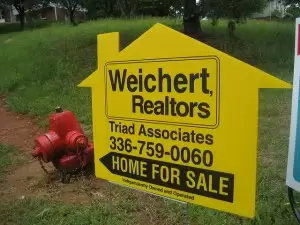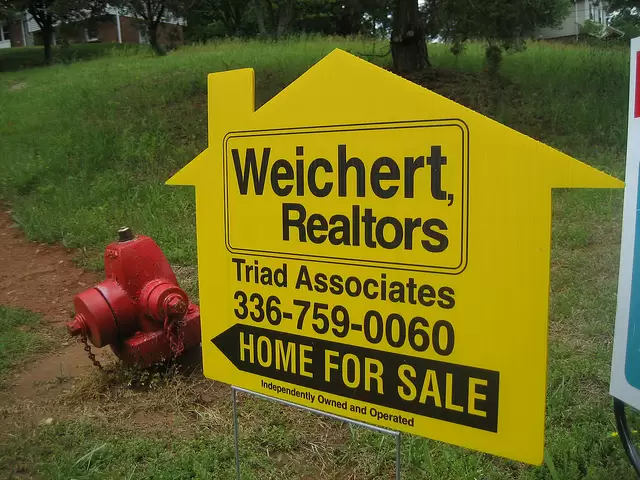Every now and then, I look at houses for sale and think about buying one. Usually this happens a few months before my apartment lease expires. I just moved into my apartment in June, so I should have no reason to be looking at homes. And yet, I find myself searching through Zillow and looking for houses in my price range that I might want to buy.

I know, I know. When you buy a house, it immediately loses value like a car. And don’t forget all the property taxes and maintenance costs. But the stupid “American Dream” won’t get out of my head and I can’t help but look.
Recently, I found a house that looked pretty nice and I thought it might be worth pursuing. The asking price was $153,000.
So I explored the financials a bit. Right now I pay $850 a month in rent, so I’d like to keep my home expenses around that price point.
Let’s pretend I liquidated a bunch of assets to come up with a 20% down payment of $30,600 (which would essentially be impossible for me right now; just use your imagination). I would only need a mortgage for $122,400. With a 30 year mortgage at today’s rates of around 4.0%, I’m looking at a $584.36 house payment.
I can buy a house and save almost $300 a month on my rent payment?! Sign me up banker dude!
The Hidden Costs of Buying a Home
Luckily I had a 20% down payment; otherwise I would have to pay PMI (Private Mortgage Insurance). If I had gotten an FHA loan and only put 3.5% down on the house, I would have borrowed a larger amount and the mortgage would go up to $704.88, while PMI would be an additional $141.49 a month according to this calculator.
That also doesn’t include property taxes. The taxes on this place were about $4,500 last year. That’s another $375 a month to pay my fair share for schools, roads, policemen, firemen, and everything else in my lovely city.
Oh, and I’d also need to come up with a few thousand bucks on top of the $30,600 to pay closing costs. Either I can pay it up front, or roll it into my mortgage. Let’s say we throw it in with the mortgage and increase the payments another $20 a month.
And I can’t forget about saving some money for the maintenance costs of owning a home, like getting a new roof, or fixing a window when the neighbor’s kid decides to play baseball near my house, or buying new carpet after an unfortunate experience at Taco Bell where I didn’t make it to the bathroom in time. Let’s call that another $100 a month.
And what about taking care of the outside of the house? My apartment has a lawn service, but I won’t have that at my new home. Either I need to pay someone to do it every week (let’s go cheap at $50 a month) or I buy the equipment myself and spend my valuable spare time cutting the grass and trimming bushes.
Let’s not forget about the Homeowner’s Association fees or HOA fees. That community pool doesn’t pay for itself. I’ll take a wild guess and call it another $25 a month out of my pocket.
It would be stupid not to insure my house after I’ve already sunk $30k into it right off the bat. I’m gonna have to get a homeowners insurance policy. The general rule is that you’ll pay 1% of the value of the home in a year, so we’re talking $1,530 a year or $128 a month.
I Can’t Afford a Freaking House!!!
At first I thought I was just gonna have to pay $584.36 a month.
Then when I realized I don’t have a 20% down payment and I’d have to pay for all the other expenses incurred when owning a home, my estimated actual price comes out to $1,544.37 a month. That’s $1,000 more than I thought I would pay, and $700 more than the rent in my apartment.
Everyone always told me that I’d save money on my taxes from owning a home, but the interest I pay on the mortgage in the first year is $5,858 while the standard deduction in 2011 is $5,800. This only reduces my taxable income by $58, which saves me a whopping $15 a year.
I thought the mortgage interest deduction was supposed to help out middle class homeowners like me, but it turns out the mortgage interest deduction is only really helpful for rich people who buy huge houses and/or people who itemize a lot of other expenses.
I Honestly Don’t Know How Anyone Affords a House
I’m a single guy with no financial responsibility to anyone by myself. I have a very good job that pays me somewhere between $50k and $100k a year before taxes (maybe I’ll tell you the exact number one day, but not today!). My current net worth of about $25k is well above average for someone my age.
If anyone could afford a house at 26 years old, it would be someone like me with a good amount of income and not a lot of expenses. And yet it just doesn’t make any financial sense for me to buy a house right now. Either the prices need to come down a lot more, or I’m going to be a lifelong renter.
Kevin McKee is an entrepreneur, IT guru, and personal finance leader. In addition to his writing, Kevin is the head of IT at Buildingstars, Co-Founder of Padmission, and organizer of Laravel STL. He is also the creator of www.contributetoopensource.com. When he’s not working, Kevin enjoys podcasting about movies and spending time with his wife and four children. Lastly, Kevin holds a B.A. in Mathematics and a B.S. in Electrical Engineering.








Hey, don’t be such a dramatic scary cat. No kid is going to knock a baseball through your window, and hell, be a democrat for once in your life and help out the fire department via your property taxes. After all, you would want them to save your precious apartment if it’s on fire, right?
Anyway, you just have to be smart about buying a house. My tips (http://romeoclayton.com/2011/07/20/buy-a-home-or-investment-property/) are to make sure whatever house you buy is in a neighborhood where it would be easy to rent out in the event that you had to move, and the home’s total costs are less than what it would cost someone to rent. This way, your renters would pay your mortgage. Make sure you figure in the cost of a property manager as well just in case you don’t like making calls WHEN stuff breaks.
Believe it or not, Kevin, while it is perfectly okay to rent, it is also perfectly okay at your age, and in this market, to research a great deal on a foreclosure. You don’t have to go stupid crazy in buying a home. I just paid $100,000 for my foreclosed property. My mortgage? $700, including HOAs of $43 monthly. Of course, different geographically locations have different tax rates, which affects total price, but my annually home insurance is only $650 and my taxes are only $1300.
When I rent my home out, I’ll profit about $400, and will either throw this on the mortgage to have it paid off early or save it to go and invest in something else. Who knows?
In any case, imagine your home rented out:
Let’s say the mortgage and all costs are $1000 monthly and your renters pay $1000 monthly. Instead of saving $1000 in a savings account (assuming you have enough remaining to continue saving towards retirement) you can pay the $1000 on the home as “savings” and put the rent towards it also. In theory, not including interest, you’ll have say, a $100,000 home paid for with only $50,000.
Furthermore, when it is paid for, you will pretty much have a guaranteed income stream of at least $1000 for the rest of your life. Where else can you almost guarantee a return of $12,000 yearly on $50,000 of leverage funds?
Anyway, just my thoughts. Be diversified and “don’t prevent wealth.” 🙂
That’s a great point, and I would definitely only buy a house if I thought I could rent it out and at least break even.
In fact, I would love to find a rental property and start making some passive income, but I can’t even find something I want to live in that would be cheaper than my apartment, so I’d have to look harder.
For foreclosures, how did you find yours? I’d love to look for those kind of deals, but the only place I found that has information on them charges $50 a month.
We bought a foreclosure as well and found ours listed online on the local Coldwell Banker and Prudential websites. Normally the listing is the same as others, but says “SOLD AS IS. Seller will do no repairs” etc, etc. That is usually an indication that it’s a foreclosure.
Most real estate brokers have lists of foreclosures and short sales. You can normally just walk into an office and they will have them available.
Foreclosures are a fantastic investment. Especially if you’re pretty handy and can do repairs and upgrades yourself. A fresh coat of paint works wonders.
Just to let you know, you get to deduct more than just mortgage interest when you itemize (Local/Sales Tax, Property Taxes, Car Taxes, Charitable Contributions/Donations, and Health Expenses over a certain percent of AGI) so when you factor those in, you would gain significantly more than $58 dollars for a savings of $15 a year. My itemized deduction is $17,122 for this year (only 7,860 from Mortgage Interest), well above both the standard deduction for a single or married filing jointly.
Also, I only pay 0.22% for homeowner’s insurance each year although I know of others that pay around 0.5% but not anywhere near 1% per year.
And I have heard of people doing 80/20 loans for their 20% down payment to avoid paying PMI but don’t have one myself so I haven’t done tons of research on the topic.
So there are a few things to reduce your calculation significantly pretty easily.
That’s a good point about the itemizing other things on your taxes, with property taxes being a big one.
For Homeowners insurance, I’ve read Texas has the most expensive policies in the nation. That may be the reason I’m quoting higher than you pay. http://www.forbes.com/2005/02/25/cx_sc_0225home.html
80/20 is an option to avoid PMI, but it also means you have to take out an unsecured loan from the bank, when means they are going to charge you a lot of interest on that loan. I’m not sure which would be more or less expensive: I’d have to run the numbers.
All good points. Thanks!
Homeowner here! Buying a home is a tough decision – while it does allow you to plant your own flowers and paint your own walls, it is a huge freedom sink (monetarily and geographically). I can tell you my Homeowner’s Insurance is less than what you quoted (smaller lots in the Bay Area, that probably helps).
In California you don’t need to be rich to get the MID. If you get a reasonable salary you’re already itemizing since income taxes are higher, so just tack interest and property taxes on top of those (add charity and you recognize that I’m taking all three of the big three deductions). I’m sure it’ll hit the Bay Area hard if the MID ever goes away.
You’re smart to look at the numbers and the details instead of jumping on it as soon as you know the best case price. Definitely factor in the utilities as well – we do ~ $300 – $350 a month on those (some of which might be picked up by your landlord now – garbage, water, gas maybe?).
On the Taco Bell – just tile the bathrooms and use a hard floor on the outside, haha.
I mentioned it above, but Texas has the highest insurance rates in the nation (unfortunately). That’s why my quote was so high.
We also don’t have state income tax in Texas, so while I’m not complaining at all, it does reduce tax benefits.
I think the main lesson I learn every time I look at this is that I shouldn’t even consider a house until I have that 20% down payment.
Yeah, I think FHA increased it’s PMI next year (the FHA is a politically pinball – certain interests want it to fill the vacuum created by Fannie/Freddie) to like 1.1% or 1.15% annually. If you do the math on it just add that straight to your rate… it *might* still make sense, but you’re better off going for the gold standard 20% down.
You’ll probably still want a house by then, so just pay attention now. Follow houses in the neighborhoods you like in preparation – maybe check out a few open houses. Find value – the house we bought was ~ $100K less than comparables because we knew what work we were willing to do.
I am not rich and I don’t live in a super big house. It’s slightly over 2000 square feet. Yet, between interest, property taxes, and charitible donations we’ve been able to itemize and we’re squarely middle class. Now that we re-financed, we’ll start to lose that ability since our interest payments will drop, but that’s still more money in my pocket.
The thing you haven’t accounted for is that if you own a house, your net worth goes up every month in two ways: By the amount of principle you pay (which increases each and every month) plus whatever increase your home sees in value (now that the worst is behind us, this should hopefully go up). When you rent, this goes up by exactly zero every single month.
Just stuff to consider.
I disagree that your net worth goes up every month in a house. It CAN go up every month, but it can also go down.
I’m not convinced we’ve hit the bottom of the housing market because 1.) mortgage rates wouldn’t be so low if we had and 2.) as I mentioned above, it seems too expensive still.
If I buy a house at $150k and it’s worth $130k next month, it’s gonna take me years just to break even (unless of course the value goes back up).
I would NEVER factor the value of the home into the calculations of whether to buy a home or not. Assuming it would always go up is what got our economy into this mess in the first place.
Agreed. My first home that I paid $193K for is valued at $119 according to Zillow.com’s crappy Zestimates. But, it has not deterred me from purchasing another home. 🙂
But…
You said you live in Texas, which in most areas, sees homes appreciating or holding stable.
Texas also hasn’t seen the “gold rush” that Miami, Las Vegas and other places saw, so dramatic value swings are not likely.
I agree with you that you should never factor in the value of a home, but areas with stable values rarely saw dramatic swings; e.g. $150 to $130. You may see $150 to $145, in which case yes it will take some time to recover, but you should never buy a house assuming your going to move in a few years. That’s just a bad strategy.
I wouldn’t say homes in Texas always hold their value.
Check out this foreclosure that’s listed at $500k. Last tax appraisal was $1.7 Million.
http://www.zillow.com/homedetails/1711-Nelson-Dr-Irving-TX-75038/67952921_zpid/
Fair enough, but I would counter that it’s a foreclosure and a McMansion.
Would you agree that most middle class homes were relatively stable?
According to Zillow, Texas as a whole and most metro areas fared pretty well.
http://www.zillow.com/local-info/TX-home-value/r_54/
I have been going through these calculations the past couple years myself. I seem to get home fever in the spring, then i spend a couple months string at houses/condos online and playing with mortgage calculators. Fortunately i haven’t had a 20% down payment (without dipping into emergency fund) for what I consider my price range (around 100K). Next spring may be rough to stay out of the housing market because I will likely have saved enough by then.
Yeah, the 20% down payment seems to be the dealbreaker for me. I don’t think I can get into a house until I have that much.
The tax benefits are HUGE! But still, with the risk of the market and the things that can (and will) go wrong, you should always go into home ownership with your eyes wide open!
I am not at all confident that housing prices are stable. I can see them going much lower. That’s another reason I’m scared to buy right now.
I wouldn’t go that far as to say that the tax benefits are huge. Kevin was on point that the mortgage home interest deduction, even with other itemized deductions, doesn’t save much unless your mortgage interest is over $2000 monthly.
For example, let’s say for the sake of argument that he pays $8000 a year in mortgage interest on his $150,000 home, and another $4000 in taxes and insurance premiums, for a total of $12,000. These will probably be the biggest amounts to itemize.
People seem to think that itemizing is the key to wealth. Sure, but not for us loley middle classers’.
Check out a schedule A. The categories to itemize are Medical and Dental Expenses, Taxes You Paid (property and state and local taxes most likely), Interest you Paid (mortgage, mortgage premiums , and points), Gifts to Charity, Casualty and Theft Losses, and Unreimbused Employee expenses. It’s not likely that young Kevin here will increase his itemized deductions beyond the $12,000 with a home that’s only $150,000.
So, okay, let’s now say that Kevin is on the high end of the income spectrum, $100,000, and has an AGI of say, hell, $100,000 for the sake of simplicity. After subtracting a standard exemption credit of $3600 and his itemized $12000, he’ll have to pay taxes on what $84,400, as opposed to $100k-$5700(single standard deduction)-$3600(exemption) = $90.7K.
Hmm. According to the tax tables, his tax liablity will be $18,188 or $15,544, respectively. He’ll have an approximate yearly savings of only $3000.
My point is, I wouldn’t ever suggest that someone purchases a home for the sake of saving on taxes. 🙂
By the way, here’s the link to the tax tables: http://www.irs.gov/publications/p17/ar02.html#en_US_2010_publink1000175003
I hear what you’re saying Kev. The thing is, a lot of people your age make more and have much more saved. Their parents might help too.
Believe me when I say there’s much more money out there!
It could definitely make sense for some people. For example. if I were married to someone with a job similar to mine, we’d have double the income and could probably easily come up with the down payment and pay everything without a problem. There are lots of individual circumstances where people are better off than me.
But I do know that I’m definitely above average financially for 26 year olds, and it’s crazy that I’m nowhere near financialy ready for a house.
You answered it right there. Two people making $80,000 a year at 26 also have perhaps more than double your savings too.
Housing has become a dual income our purchase for many thanks to opportunities for more people.
I think being married with two incomes helps a lot. I can only think of one of my single friends who has bought a house by themselves and their parents paid for part of the mortgage. Also, some people look at what is the maximum amount allowed and think that is the amount the can afford. I found this calculator http://www.bankrate.com/calculators/mortgages/maximum-mortgage-calculator.aspx which if you type in $8333.33 income per month (100k/year) and leave the other numbers the same, it says you can afford a housing payment of $2500/month (this would include taxes, insurance, pmi). If I was making $8333.33/month and taking home, lets say $5833.33 (70%), I certainly wouldn’t want to be spending $2500 on my house!
Oh yeah, Warren Buffett purchased his first home at 26. Just saying. 🙂
Yes there are tons of hidden costs, and I’d be happy if I ONLY spent $100/month on maintenace. Still, owning can make sense if done correctly.
1) Take emotion out of it. This shouldn’t be a problem as you’re a guy.
2) Talk with Debt Ninja since you both have similar topics, yet different viewpoints. (Did you plan this?)
3) Look into multi-family homes. You might be able to get a duplex or quadplex and live in one of the apartments while paying the mortgage from other tenants rent. As previous commenters stated, you are now using other peoples money to pay down your mortgage! Yes there will be some extra headaches and whatnot, but it’s up to you to determine if it’s worth it.
Tax advantages are pretty much minute unless you own a rental property, in which case you get to deduct the depreciation on the land improvements over 27 years, or whatever number it is…something like that.
I don’t think owning a home is really all it’s made out to be. Mostly because there’s a lot of disinformation about the true benefits of the mortgage interest deduction, and because most “buy a home” advice appears to be tailored to people who have no other mechanism or motivation for saving money elsewhere.
Oh, and there’s the whole government thing in housing. Uncle Sam owns 250,000 homes he doesn’t want to sell because he doesn’t want housing to be affordable for people like you: http://www.businessweek.com/magazine/foreclosures-uncle-sam-and-his-248000-homes-09012011.html
Many people would have stopped right at $584.36 a month. Sweet!
Ugh! Zillow is the WORST website ever.
I’m a Realtor, and we get buyers all of the time who look on Zillow and they want to see a certain house… Unfortunetly, half the time the house is either under contract or it has been sold a long time ago.
For sellers, it gives a false Zestimate. Zillow doesn’t know what areas or neighborhoods compare to what, and they tank the zestimate if the house is listed for rent.
If you ever want up-to-date information on any house, go to your local Realtor!
Anywho, we always recommend new homebuyers to have at least $10,000 cash After closing incase maintenance issues arise.
I think some in the comments here hit on it. I am a single income for a household of 5 (3 kids 1 wife) I make a decent living but live in the San Francisco Bay area. My house payment with taxes is 2800 a month. Mind you that is for a 1200 square foot house. Not large at all. By the time i write off the interest and property taxes (5grand), it works out to a little less then renting in the bay area. Plus it will be paid off and mine no time (23 years left). Your right, sometimes it does not make sense, but right now with rates low and the market in the toilet it is a great time, unless of course you are going to invest and some day pay cash for a house. Not having a mortgage payment or rent would rock.
Im on house number 3. They are TERRIBLE investments. By the time you add it all up, you can’t make money over renting. Not in 2004, not in 2009, and most likely not in 2014/2015, when I sell my current one.
If you want one, do it for reasons other than an investment. And once you do it, STAY PUT. I have heard the “wisdom” of staying at least 3-5 years. That is bull. You need to stay a lot longer than that to even have a chance of beating the cost of renting.
The real problem with homeownership: Trying to sell the damn illiquid thing.
Ha Ha! I had to laugh at your response. Sorry, but this is so very true. My husband and I are on our second home and it took us about 6 years to sell the first one. Meanwhile, we rented it out at a loss of about $300 a month….for 6 years (when it wasn’t vacant and we had to cover the entire mortgage!) Now we are looking at moving and renting out our property for another $500 a month LOSS until the market decides to rebound (HAHAHA!!! who knows when that will be!). If you can snag a fixer-upper and do the work yourself you may be able to rely on rental income to cover your mortgage, otherwise you’re stuck with covering the mortgage and probably will not break even unless you got a really good deal on the price. Houses are terrible investments unless you know for sure that you will live there for at least 20 to 30 years to pay it off. Otherwise you’re better off throwing your money down the toilet in the stock market at this point in time. Better odds.
Oh yeah, and think you will just rent it out if you can’t get it sold… I had a renter who was in a rent-to-own situation with me and she still STILL couldn’t get the rent paid on time and couldn’t honor other aspects of the lease agreement.
I tell every 20 something I find out is considering a house not to bother (few take my advice, however).
Garbage investment.
Someone mentioned renting a house is a good investment; one big assumption they made was that the renter would pay rents on time or at all. What if the renter loses his job & refuses to pay. At least in MD you can’t even evict for 6months.
The most hiddeniest hide-and-go-seek expense in owning a house is AMORTIZATION.
Yeah, I know, your eyes glazed over. Ugh. What is amortization? It is the way you pay back your loan. People think…. I got a $100K loan at 5% so all my payment will go 95% toward principal and 5% toward interest.
Wrong! Google amortization calculator and you will see that the first payment is 99.5% interest and .5% principal. It SLOWLY goes down from there.
And here’s the kicker. The average homeowners moves every 5-7 years. That means they sell the house long before they even make a dent in the mortgage because the amortization schedule is sloped against ’em.
So I will say out loud the dirty little secret that everyone in the industry knows… it is financially idiotic for the average American to buy a home with a mortgage.
Rent. Maintain flexibility in a volatile economy.
Someday you will thank me.
You have made some very good points, although there can still be alot of benefit to home ownership especially if you can buy at the right price in the right area.
I think a lot of it boils down to how much money you have to work with and how long you plan on staying in an area. If I was an employee I would not be as willing to purchase a house anymore, but if I was pretty tied down to an area and I had a decent amount of money in the bank I would probable buy a home.
My husband and I feel exactly the same way! It’s very discouraging. We make almost 100k combined and have one child. We are in our early 40s and late 30s so you would think we could get in a house. I wish. It’s upsetting that our younger relatives all have a house and don’t get why we are not in one. When my take home pay is 2k and the housing expenses (counting utilities) is my entire pay, no way are we getting a house.
Right now we can save $1500 a month so we are staying until we can pay cash for a house or the payment will be under$300 with no other debt and a 10-12 month emergency fund.. No job is safe these days and I just feel better knowing if one of us lost our job, we would only need to touch $500 of savings a month to make up the difference. I refuse to put our family at risk by stretching things so tightly. Our apt is 767 sf and with another child on the way next year it’s not easy, but losing a house would be even harder so we suck it up.
I don’t think there’s a blanket “buying is better / renting is better” answer; it depends on the price vs. rent ratios in your area. In Cincinnati, buying is generally cheaper than renting if you’re going to live there longer than 7-10 years, but in Boulder, Colo., renting is usually cheaper, even over the long haul.
That said, those are only rules of thumb. You need to do the math based on your own situation … but you definitely have to consider all the costs of homeownership. I’m shocked at how much I spend on little things like new gutters, a tool that helps me clear leaves out of the gutters, a lawnmower, a paint sprayer, a new washing machine, etc.